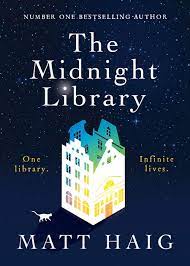In Matt Haig’s The Midnight Library, Nora Seed (single, unemployed and 35) is full of regrets. Every facet of her life has lapsed into failure. She decides to end it all, but unexpectedly finds herself in the Midnight Library. Here she has an opportunity to try a succession of different lives by reversing past decisions.
 In one life she continues her teen swimming career instead of dropping out. In another she pursues rock music instead of university. Then she chooses science rather than philosophy. Once she accepts an invitation to coffee instead of declining.
In one life she continues her teen swimming career instead of dropping out. In another she pursues rock music instead of university. Then she chooses science rather than philosophy. Once she accepts an invitation to coffee instead of declining.
In each life, however, she doesn’t go back to the point of decision. Rather she picks up that life at age 35 and sees where it has taken her. As a result she grapples with her life, with the nature of choices, the importance of relationships, the meaning of regret, and what she truly values and desires.
Matt Haig’s moving and thoughtful book highlights the significance of our decisions. They matter and truly make a difference. Helping an elderly neighbor, befriending a troubled teen—these can have life-changing consequences for us and for others. We are not trapped in eddies of meaningless. In addition, no matter what choices we have made (good or bad, wise or foolish), we can still make decisions in the life we have right now that can move toward redemption.
Haig goes too far, however, in embracing the uniquely American myth (though Haig is British) that anybody can be anything. We do not live in a world of infinite possibilities, as the book posits. I could never have been a professional basketball player regardless of the decisions I made. And millions can never become world famous who are locked in generational cycles of poverty with minimal options for education, career tracks, parental nurture, and health care. If a few can break out, the exceptions prove the rule.
Our lives will not be perfect. Nonetheless, we can grow wiser and more compassionate. And that is no small thing.
